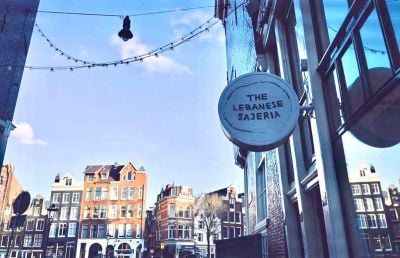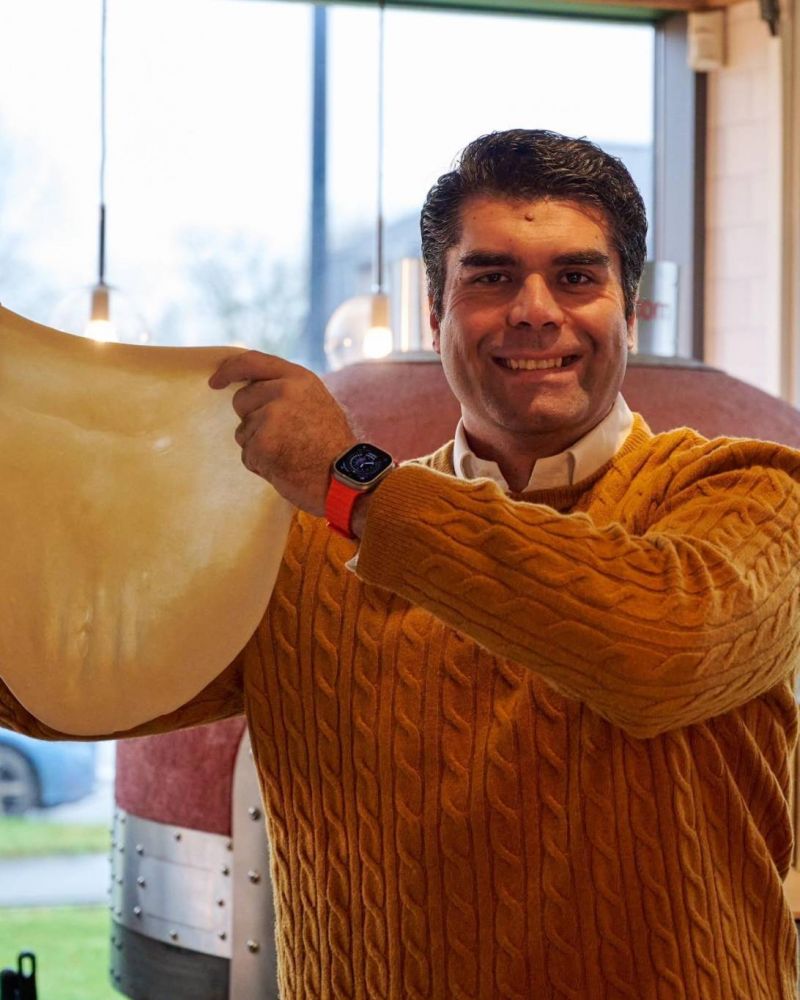
Nehme Darwiche holds a piece of dough at his restaurant Beiruti in Brussels, Belgium (Courtesy of: Nehme Darwiche)
BRUSSELS — The smell of freshly baked manaeesh wafts through the air — not in Beirut but in central Brussels, Belgium, just a few hundred meters from the Grand-Place.
The source of the delicious smell: Beiruti, a cozy restaurant that takes Belgium’s Lebanese diaspora back to the warmth of home. For the non-Lebanese in the crowd, the restaurant lets them experience, if only for a few hours, what having breakfast, lunch or dinner at a homey kitchen in Beirut means.
Lebanese music gently plays in the background. One song starts with the lulling voice of Fairouz in the background, then comes the festive music, and even wedding dabkes.
On the walls are pictures of famous Lebanese celebrities like Fairouz, Ziad Rahbani and Sabah.
In the center is the photo of a kind elderly grandmother and beneath it, the phrase “When will I see you ya Nehme?”
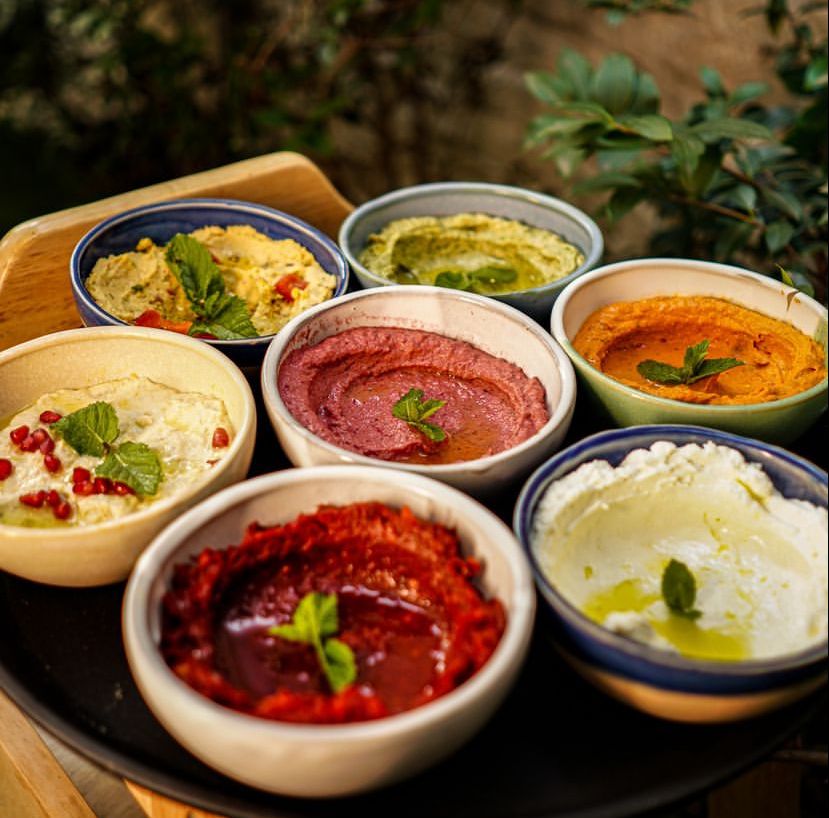 A tray of seven different dips served at Beiruti. (Courtesy of Beiruti/@beirutiofficial via Instagram)
A tray of seven different dips served at Beiruti. (Courtesy of Beiruti/@beirutiofficial via Instagram)
“Most of the recipes here are hers, I owe her a lot,” restaurant owner Nehme Darwiche tells L’Orient Today. Now in his late 30s, he founded Beiruti in 2019.
Yet Darwiche’s history with cooking dates far earlier. Laughing, he tells L’Orient Today he’s “lucky enough to be from a family that considers cooking good food one of its favorite hobbies.”
“My most vivid memories of my childhood are when my mother, her sisters and my grandmother and all of us, all the children are gathered together in the kitchen of my grandmother. It was a very typical Lebanese house and a very Lebanese kitchen and everyone always felt involved,” he remembers fondly.
“So when we wanted to make tabbouleh for example it didn’t matter how old you were, learning how to chop parsley for me was learned during those times as a child,” he explains.
But one memory of those days would always stand out to him. “I would say honestly when we made knefe we all had to work on it and the final result was always satisfying.”
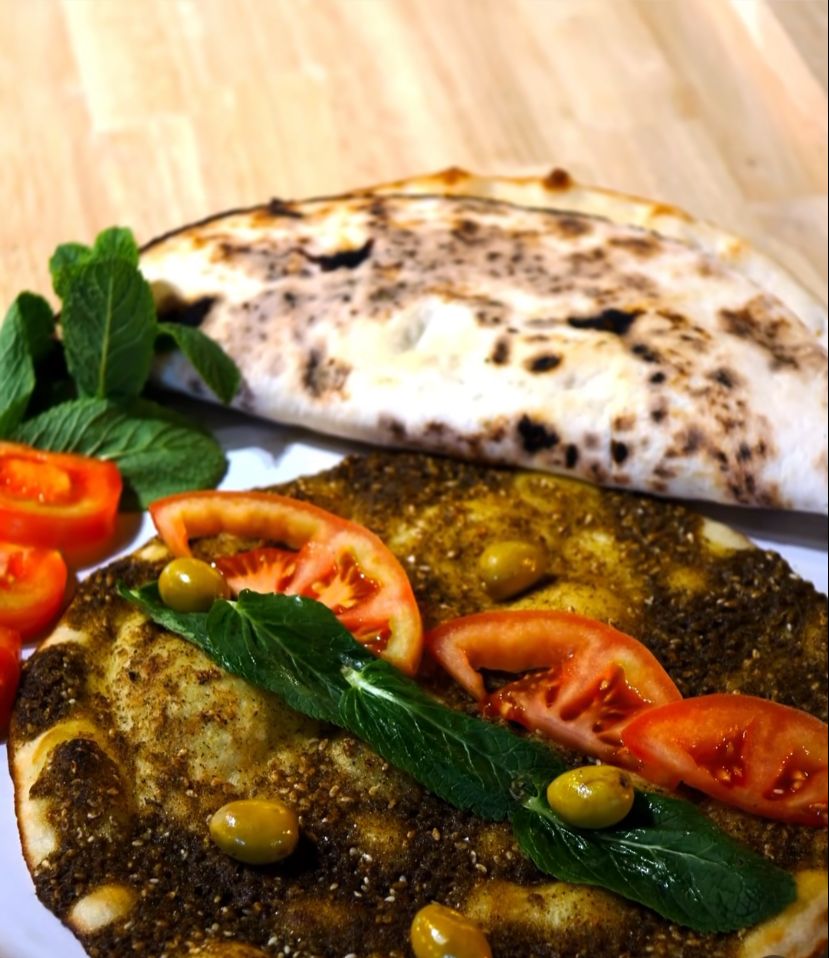 Freshly baked zaatar manaeesh served with olives, tomatoes and mint. (Courtesy of Beiruti/@beirutiofficial via Instagram)
Freshly baked zaatar manaeesh served with olives, tomatoes and mint. (Courtesy of Beiruti/@beirutiofficial via Instagram)
Knefe is a dessert, typically eaten for breakfast in Lebanon and is soaked in a sweet, sugar-based syrup and typically layered with cheese and other ingredients such as cream, pistachios or nuts.
“It would be a Sunday morning and we would come together and someone would turn on the gas oven, someone would start cutting lemons and someone would be washing the cheese that was soaked in water from the day before. Another person would start preparing the dough and then we would go to the baker and get the kaake to put the knefe in it. It was a very beautiful time for me,” Darwiche says.
And on other days, his grandmother’s sandwiches “were like the Mona Lisa,” Darwiche says.
“The sandwiches she would wrap for me to take to school were filled with labneh, tomato, olives and mint but she would beautify it so much it was almost like a painting.”
“People eat with their eyes before their stomach,” he says.
Darwiche’s father’s side of the family had several restaurants in Beirut which helped Darwiche learn the craft of cooking in bulk and for others from an early age.
“We had a restaurant called Eagles Nest near Bliss Street in Hamra. This restaurant was very good because equally from my father’s side we learned how to grill a classic Lebanese grill,” he explains with a laugh.
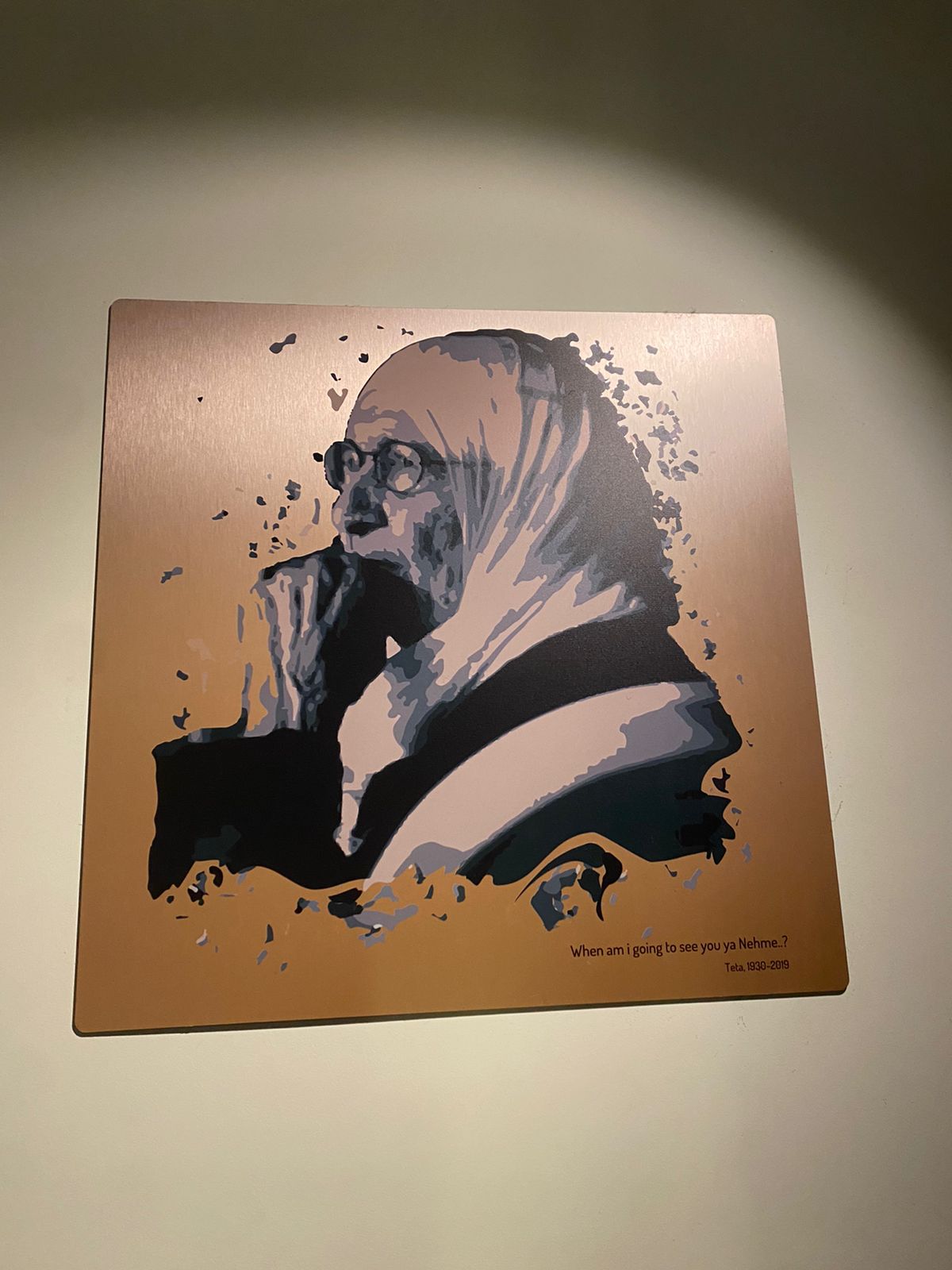 Nehme Darwiche's grandmother's photo in Beiruti, Brussels. (Credit: Ghadir Hamadi/L'Orient Today)
Nehme Darwiche's grandmother's photo in Beiruti, Brussels. (Credit: Ghadir Hamadi/L'Orient Today)
Whether we were cooking the [traditional Lebanese] Sunday barbeque at family gatherings or cutting up onions in the family’s restaurant with his uncles who were the chefs, Darwiche was being prepared, without knowing it, to work in the food business.
“My brother and I were in Sagesse school Ain al-Mraisseh, so we used to walk from school all the way to the restaurant to help out sometimes and were doing service and handling the guests and we learned a lot from growing up in this environment so we learned a lot,” he explains.
Beirut memories
One day in February, a group of people at Beiruti are celebrating the birthday of their friend. The waiters head to the table and start clapping and cheering. Some patrons are shy to join in the beginning but soon enough the rest of the customers enjoying a meal begin clapping and cheering too.
It almost feels like a birthday celebration in a restaurant in Beirut.
New savory Lebanese dishes inspired by Darwiche’s grandmother are regularly introduced to Beiruti’s menu. Mlokheye, a dish made out of a jute plant, cooked with chicken and served with white rice and vermicelli is among the dishes coming soon, Darwiche says.
The reason behind adding it to the menu?
Simply because the simple leafy stew is“my favorite dish cooked by my grandmother and mother.”
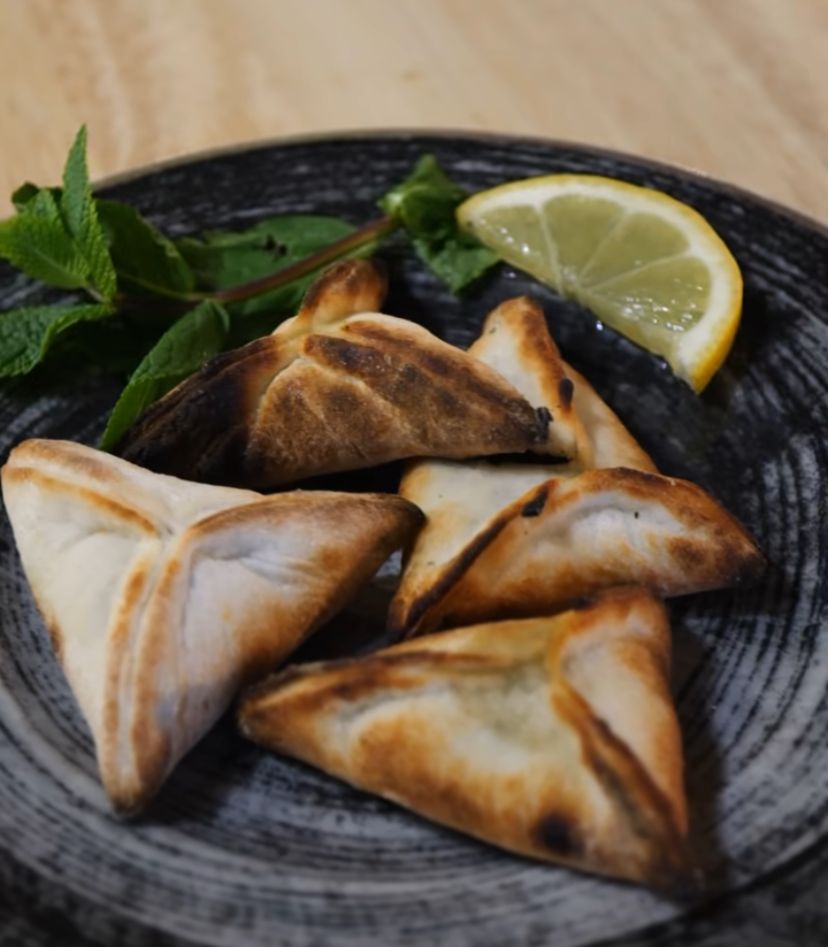 Spinach pies served at Beiruti with lemon and mint. (Courtesy of Beiruti/@beirutiofficial via Instagram)
Spinach pies served at Beiruti with lemon and mint. (Courtesy of Beiruti/@beirutiofficial via Instagram)
It’s a memory that he still carries after leaving his home in Lebanon. At 20 years old, he moved to Abu Dhabi after getting a degree in Hospitality Management from the Lebanese University.
His first job in Abu Dhabi? Washing dishes at a hotel — but he had big dreams for himself.
"I came to Belgium because I got married to a Belgian woman who I met in Abu Dhabi... When I was here, I couldn’t find a proper place to eat," Darwiche says.
"The first thing I said is, where are the manaeesh in Brussels? And so Beiruti was born."
"I’m happy that we can share a little bit of Lebanon through the food and through the culture and the stories of the dishes.”
He says his restaurant is also about honoring tradition and sharing memories. One Lebanese tradition of serving water on behalf of dear ones who had passed away is also present in Beiruti, in the bottles of water labeled with an homage to Darwiche’s grandmother.
"It means a lot to me to give water for free on behalf of my grandmother... I love how the Belgian people have reacted to this and how the European community has reacted to much of our culture that we share with our customers."
In one unique twist, Beiruti serves only water with their food, encouraging patrons to experience the full spectrum of flavors. He says he wants customers to experience the most authentic Lebanese meal possible.
Reflecting on his journey, Darwiche shares a bittersweet moment — his grandmother died three days before Beiruti opened, and never had the chance to visit the restaurant.
And yet, he says, she is still “with us every day in spirit.”
